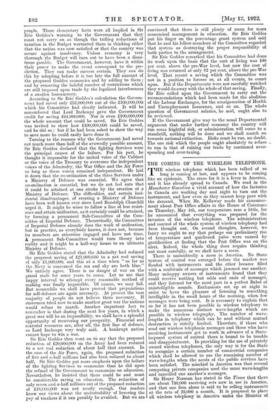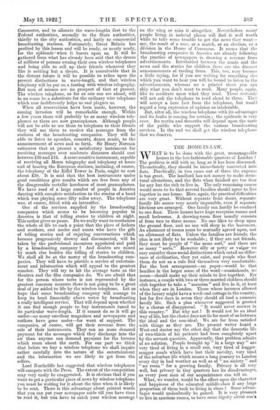THE COMING OF THE WIRELESS TELEPHONE. T HE wireless telephone which
has been talked of so long is coming at last, and appears to be coming like an epidemic. The craze for it is a fever in America, and it has already spread to Canada. We read in the Manchester Guardian a vivid account of how the factories in Canada are working day and night to turn out the instrument, and how even so they cannot keep pace with the demand. When Mr. Kellaway made his announce- ment about Post Office affairs in the House of Commons on Thursday, May 4th, our temperature rose a little, for he announced that everything was prepared for tho invasion of the wireless telephone. The administration and control of the whole system of wireless telephony had been thought out. On second thoughts, however, we fancy we ought to say that perhaps our preliminary rise of temperature and quickened pulse were caused by gratification at finding that the Post Office was on the alert. Indeed, the whole thing does require thinking out most carefully, or we shall have a mess.
There is undoubtedly a mess in America. No State system of control was arranged before the market was flooded with instruments and the ether became filled with a multitude of messages which jammed one another. Many unhappy owners of instruments found that they could receive nothing but odds and ends of messages, and they listened for the most part to a perfect Babel of unintelligible sounds. Enthusiasts sat up at night in order to have the pleasure of listening to something intelligible in the small hours of the morning, when few messages were being sent. It is necessary to explain that so far it has not been possible in wireless telephony to make the numerous distinct wave-lengths which aro possible in wireless telegraphy. The number of wave- lengths in telephony which can be used without mutual destruction is strictly limited. Therefore, if those who send out wireless telephonic messages and those who have receiving instruments get to work in advance of a State- imposed system of control there is bound to be trouble and disappointment. In providing for the use of privately owned wireless telephones, the only way is for the State to recognize a certain number of commercial companies which shall be allowed to use the remaining number of wave-lengths when the needs of the public services have been satisfied. The mischief in America was that several competing private companies used the same wave-lengths and cancelled one another's messages.
Sir Henry Norman has stated in the Times that there are about 750,000 receiving sets now in use in America, and that one firm alone is said to be selling instruments at the rate of 25,000 a month. It is proposed to place all wireless telephony in America under the Minister of -Commerce, and to allocate the wave-lengths first to the -Federal authorities, secondly to the State authorities, thirdly to the city authorities, and lastly to commercial - broadcasting stations. Fortunately, Great Britain has profited by this lesson and will be ready, or nearly ready, for the epidemic when it bursts upon us. It will be gathered from what has already been said that the dream of millions of persons owning their own wireless telephones and being able to call up their friends whenever they like is nothing but a dream. It is conceivable that in the distant future it will be possible to refine upon the present distinctions in wave-length, and that wireless telephony will be put on a footing with wireless telegraphy. -but men of science see no prospect of that at present. The wireless telephone, so far as one can see ahead, will in no sense be a substitute for the ordinary wire telephone which now indifferently helps us and plagues us.
When all reservations have been made, however, the coming invasion will be remarkable enough. Within a few years there will probably be as many wireless tele- phones as there are now gramophones. Although people will not be able to use them to telephone to their friends they will use them to receive the messages from the stations of the broadcasting companies. They will be able to listen to speeches, concerts, dance music, to the announcement of news and so forth. Sir Henry Norman estimates that at present a satisfactory instrument for receiving messages over moderate distances should cost between £10 and £15. A more sensitive instrument, capable of receiving all Morse telegraphy and telephony at home and of hearing the European stations, including, of course, the telephony of the Eiffel Tower in Paris, ought to cost about £30. It is said that the best instruments under good conditions give results which are free from any of the disagreeable metallic harshness of most gramophones. We have read of a large number of people in America dancing with complete satisfaction to the strains of a band which was playing some fifty miles away. The telephone was, of course, fitted with an intensifier.
One of the services supplied by the broadcasting companies which seems to be becoming popular in America is that of telling stories to children at night. This rather gives us pause. Do we really want to mechanize the whole of life to such a point that the place of fathers and mothers, and uncles and aunts who have the gift of telling stories and of enjoying conversations which become progressively drowsy and disconnected, will be taken by the professional raconteur appointed and paid by a broadcasting company ? And doubts are raised by much else besides the telling of stories to children. We shall all be at the mercy of the broadcasting com- panies. They will have to provide a service of entertain- ment and information which will appeal to the greatest number. They will try to hit the average taste as the theatres and the film companies do. We are afraid that for the person whose taste is not represented by the greatest common measure there is not going to be a great deal of joy added to life by the wireless telephone. Let us hope that some broadcasting company will manage to keep its head financially above water by broadcasting a really intelligent service. That will depend upon whether it can find enough people to buy instruments tuned to its particular wave-length. If it cannot do so it will go under—as many excellent magazines and newspapers and authors have gone under—for want of support. The companies, of course, will get their revenue from the sale of their instruments. They can no more demand payment for the messages which they discharge into the air than anyone can demand payment for the breezes which roam about the earth. For our part we think that before we buy a wireless telephone we shall inquire - rather carefully into the nature of the entertainment and the information we are likely to get from the sellers.
Lord Northcliffe has suggested that wireless telephones will compete with the Press. The extent of the competition may very easily be exaggerated. It is obvious that if you want to get a particular piece of news by wireless telephone you must be waiting for it about the time when it is likely to be sent. There is this advantage about printed words that you can put your newspaper aside till you have time to read it,' but- you have to catch your wireless message on the wing or miss it altogether. Nevertheless, many people living in isolated places will find it well worth while to take some trouble to get the news they want— say, the result of a race, or a match, or an election, or a division in the House of Commons. It seems that the broadcasting companies in America are already following the practice of newspapers in drawing a revenue from advertisements. Interlarded between the music and the news and the stories for children there are the discreet announcements of trading firms. This, too, may become a little trying, for if you are waiting for something else which you want to hear you will be bound to listen to the advertisements, whereas on a printed sheet you can skip what you don't want to read. Many people, again, like to meditate upon what they read. These certainly will not ask the telephone to read aloud to them. They will accept a bare fact from the telephone, but woul■ I regard a long expression of opinion as intolerable. But, after all, the wireless telephone with its advantages and its faults is coming for certain ; the epidemic is very near. Its merits and demerits will depend upon the taste of the public who support the various broadcasting services. In the end we shall get the wireless telephone that we deserve.



































 Previous page
Previous page